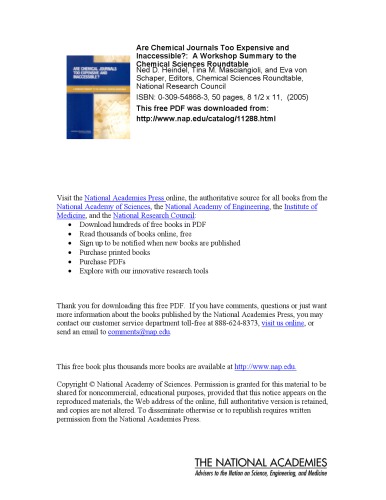

Most ebook files are in PDF format, so you can easily read them using various software such as Foxit Reader or directly on the Google Chrome browser.
Some ebook files are released by publishers in other formats such as .awz, .mobi, .epub, .fb2, etc. You may need to install specific software to read these formats on mobile/PC, such as Calibre.
Please read the tutorial at this link: https://ebookbell.com/faq
We offer FREE conversion to the popular formats you request; however, this may take some time. Therefore, right after payment, please email us, and we will try to provide the service as quickly as possible.
For some exceptional file formats or broken links (if any), please refrain from opening any disputes. Instead, email us first, and we will try to assist within a maximum of 6 hours.
EbookBell Team

0.0
0 reviewsOn October 25-26, 2005, the Chemical Sciences Roundtable held a workshop to explore issues involving those who use and contribute to chemical literature, as well as those who publish and disseminate chemical journals. As a follow-up to the workshop, a summary was written to capture the presentations and discussions that occurred during the workshop. As a forum to discuss chemistry journals within the larger context of scientific, technical and medical journal publishing, the workshop covered whether chemists and chemical engineers have unique journal needs and, if so, whether these needs are being met in the current journal publishing environment. Workshop participants also tackled how open access publishing might be applied to the chemical literature, such as to provide authors more freedom to distribute their articles after publication and allowing free access to chemical literature archives.